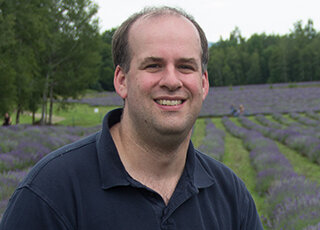What to Know About Bennington and the Eclipse
Five Questions with Astronomer Hugh Crowl
Hugh Crowl, astronomer and faculty member in astronomy and physics at Bennington, is teaching a class this term all about the total solar eclipse crossing nearby Bennington College on April 8. Bennington will experience a 97-percent eclipse, but the class is traveling north to Plattsburgh, NY, to be in the path of totality.

What was your first eclipse experience?
Even though I'm an astronomer, I had actually never seen a total eclipse until 2017, which was the last major eclipse that crossed the United States. The 2017 eclipse went from Oregon southeast across the United States to South Carolina. My colleagues planned a conference in this beautiful little mountain town, Stanley, Idaho, to coincide with the eclipse. The first day of the conference, Monday, was set aside for viewing the eclipse. On Tuesday and Wednesday, we talked about galaxies and galaxy evolution. For me, it was amazing, less so as an astronomer and more just as a human. I was unprepared for how cool it was. My thought in teaching this course is that I want more people to have that experience.
What makes eclipses so special?
One of the things that we've been talking about in the first weeks of the course is how rare solar eclipses are. These events happen about every 18 months somewhere on earth, but it's usually a relatively narrow band. There won't be another one that happens in the continental United States for another 20 years. There’s also this remarkable coincidence that the moon is about 400 times smaller than the sun, but it's almost exactly 400 times closer. That means that, here on earth, we see these eclipses where the moon just barely covers up the sun.
What are students learning in the class?
Hopefully, the students taking the course are able to understand what's happening up in space that allows this eclipse to happen. We’re talking about the geometry of it. We're also talking about how the sun works and the kind of science we can do only during the eclipse, such as looking at those regions of the sun that are beyond the photosphere, like the corona. The corona is quite bright but a lot less bright than the photosphere. Remarkably, the corona is actually hotter than the surface of the sun. The surface of the sun is about 5,800 Kelvin. The corona is more like a million degrees Kelvin. And among what scientists try to understand: how is something that is further from where the energy is being created, down in the core of the sun, actually hotter? We think it's tied up with the magnetic fields that come out from the sun. This is something we can study better during the eclipse than at any other time, because we can't cover up the brightest part of the sun as effectively as the moon does.
How did you choose Plattsburgh?
Three reasons. One, Plattsburgh itself is close to the midline of the eclipse, so you get the most time of total solar eclipse. There's a band of maybe 150 miles where you will see totality, but right in the middle of that band, you'll see it for the longest amount of time. There's also a big university in Plattsburgh, SUNY Plattsburgh, and I got in contact with one of the astronomy faculty members there. They're coordinating a big effort. Also, the North Country Planetarium is there, so the director of the North Country Planetarium is doing a bunch of events surrounding the eclipse. And the third reason is that Plattsburgh is on the northway, which makes me hope that the traffic leaving the eclipse won't be quite so bad.
The weather in Plattsburgh, unfortunately, is like the weather in most of New England, and April is historically cloudy. But anywhere you can go where you're in the totality, it's worth it. Even if there's a chance it's going to be cloudy, even if there's a more than 50 percent chance it's going to be cloudy, the little chance that it'll be clear is completely worth it. If it’s cloudy, we'll still experience it getting quite dark, probably as dark as it would be at night for those three and a half minutes, which is an experience on its own.
Will students be observing as scientists during the eclipse?
No. Solar physicists who have seen eclipses many times often collect data. They have a camera pointed up and take lots of images during the two or three or four minutes of the eclipse. So it's an intense time. But the experience that we have as humans is universal, whether we're scientists or not. I think the awe of seeing an eclipse and seeing sort of a 360-degree sunrise during an eclipse is incredible and amazing. It's one of these things that happens over a narrow band for a short amount of time. You can't experience it other than being there at that moment. For me, it is important that the students aren't busy during the eclipse.
Everyone who can should go. That is my message. And that's one reason I'm teaching this class, to try to get as many people to see the eclipse as possible. Just find a place that you want to go, and go.